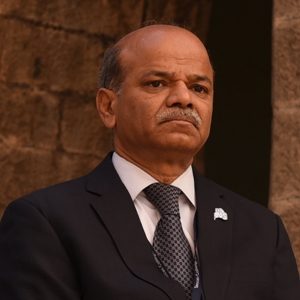
General co-chair : Dr. Vasant Shinde
Designation: Vice Chancellor, Deccan College, Deemed University, Pune
Educational Qualification:
- B.A. in History from the University of Poona
- Master’s Degree (First Class first) in Archaeology from Deccan College, Deemed University (at that time affiliated to the University of Poona)
- Ph.D. in Protohistoric Archaeology on Early Settlements in Central Tapi Basin from the same University
Publications Books: 10
Papers in national journals: 117
Research papers in: 59
Prof. Vasant Shinde, Internationally renowned Archaeologist, is presently the Vice-Chancellor of the Deccan College, Post-Graduate and Research Institute, Deemed University, Prof. Shinde has been teaching the Post-Graduate course in Archaeology since 1982.
In addition to being a Recognized Post-Graduate teacher and Research guide at Deccan College, Deemed University, University of Poona and Solapur University and EotvosLorand University of Sciences, Budapest, Hungary, he has been also conducting teaching for the Post-Graduate Diploma course at the Institute of Archaeology, Archaeological Survey of India, New Delhi, since 1991. In addition to his teaching activities, Prof. Shinde has also supervised a vast number of M.A. and Ph.D. research students. At present, 50 M.A. /PGD/M.Phil students and 29 Ph.D. students have completed their research under his supervision, with several more currently receiving guidance or co-guidance from him. He has also provided guidance to no less than 17 Visiting Scholars from foreign countries.
Prof. Shinde has been a pioneer in archaeological research since the last 35 years, specialising in the Protohistory of South Asia as well as Field Archaeology. He has completed 16 major research projects, in the process of which he has collaborated with scholars and institutes from around the world, from Institutes such as the Universities of Pennsylvania and Wisconsin in the United States of America to Cambridge and Oxford Universities in the United Kingdom, to the International Research Center for Japanese Studies and Research Institute for Humanities and Nature (both in Kyoto, Japan), Seoul National University College of Medicine, South Korea, and so on. He has also directed a vast number of excavations around the country, from Harappan sites in Gujarat and Haryana to Chalcolithic sites in Madhya Pradesh and the Deccan, to Protohistoric and Early historic Sites in Rajasthan and Maharashtra. Presently, he has been directing a very prestigious research project at the largest Harappan site of Rakhigarhi in Haryana. In the course of his research work, Prof. Shinde has also travelled to and delivered lectures at Pakistan, Bangladesh, Sri Lanka, Iran, Denmark, France, England, Germany, Belgium, Italy, Oman, Malaysia, China, Japan, South Korea, Turkmenistan and several other countries throughout Europe and Asia, as well as in North and Central America.
He has also visited and worked with more than 15 international museums around the world, analysing material ranging from the Prehistoric to the Late Medieval Period. He has been awarded a number of honours and scholarships from various national and international bodies in the course of his Academic career. Professor Shinde has delivered no less than 140 special lectures in different parts of India, and 33 in Institutes abroad. He is a member of 17 National and International academic bodies. He has attended and presented his research in a large number of conferences in India and Abroad. His contributions to Archaeology in India and abroad take the form of a large number of research papers, edited volumes and other publications, comprising 8 books, 10 edited books, 117 papers in national journals and 59 research papers in International journals alone, in addition to popular articles in magazines and other periodicals.
He has pioneered research in several fields in India, such as initiating experiments in Flintknapping. Several crucial elements of South Asian archaeology, from hitherto unknown protohistoric cultural phases to models of urbanisation in Mewar, Rajasthan, owe their discovery to him. He has initiated several levels of International Collaboration with Institutes around the world, bringing Indian archaeology to a truly global level. He has established the Society of South Asian Archaeology (SOSAA) with a view to promoting young archaeologists and further global collaboration. He has also been actively involved in Public Archaeology and established groups in Maharashtra, Rajasthan and Haryan to protect the Cultural Heritage of the country and generate awareness of the same among the general public.

